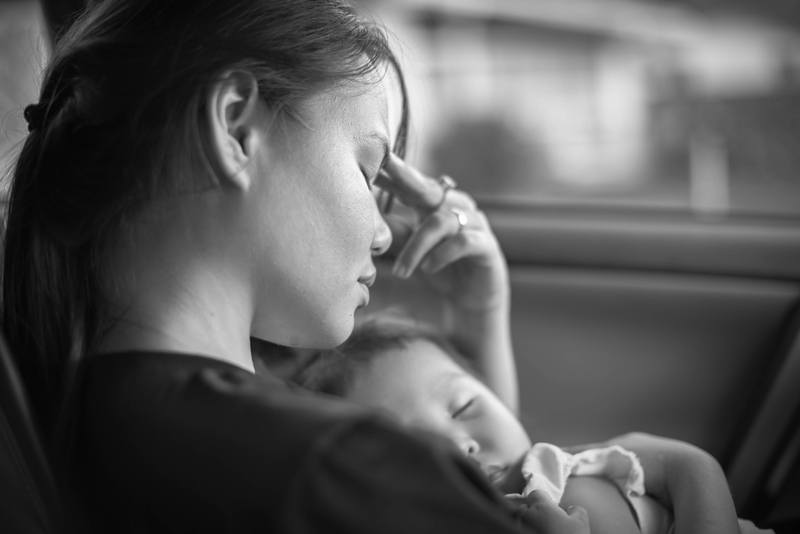
Amaha / / /
ARTICLE | 5 MINS READ
What Is Postpartum Depression?
Published on
11th Jan 2023

The birth of a baby can result in powerful emotions, from excitement and joy to fear and anxiety. But it can also result in something you might not expect — depression. Postpartum depression is a type of depression that can affect mothers after childbirth. It is a serious condition that requires treatment.
Postpartum depression can cause mood swings, problems with sleeping or eating, and leave you feeling overwhelmed and hopeless. Some women also experience anxiety, panic attacks, and thoughts of harming themselves or their baby.
In this article, we will discuss everything you need to know about postpartum depression. We will cover the symptoms, diagnosis, and treatment of this condition.
Also read: Common Myths About Postpartum Depression
What are some symptoms of postpartum depression?
Hormonal changes may trigger symptoms of postpartum depression. When you are pregnant, levels of the female hormones oestrogen and progesterone are the highest they’ll ever be. In the first 24 hours after childbirth, hormone levels quickly drop back to normal to pre-pregnancy levels. Researchers conclude this sudden change in hormone levels may lead to depression. This is similar to the hormonal changes that occur before a woman’s period but involves much more extreme swings in hormone levels.
Levels of thyroid hormones may also drop after giving birth. The thyroid is a small gland in the neck that helps regulate how your body uses and stores energy from food. Low levels of thyroid hormones can cause symptoms of depression. A simple blood test can tell whether this condition is causing your symptoms. Postpartum depression can affect women in different ways. Some of the most common symptoms include feeling overwhelmed, exhausted, and having trouble caring for your baby. You may also experience mood swings, anxiety, and irritability.
Many new mothers say they feel:
Tired after labour and delivery
Overwhelmed with a new baby
Doubts about their ability to be a good mother
Stress from changes in work and home routines
An unrealistic need to be a perfect mom
Grief about the loss of who they were before having the baby
Being uninterested in your baby or feeling like you’re not bonding with them
Like crying all the time, often for no reason
Severe anger and crankiness
Loss of pleasure
Feelings of worthlessness, hopelessness, and helplessness
Thoughts of death or suicide
Thoughts of hurting someone else
Trouble concentrating or making decisions
If you're experiencing any of these symptoms, you must talk to your psychiatrist. Postpartum depression is a serious condition and should not be ignored.
How is postpartum depression diagnosed?
Postpartum depression is diagnosed by a mental health professional such as a therapist or a psychiatrist. They will ask about your symptoms and how long you've been experiencing them. You are more at risk of developing postpartum depression if:
Have a history of depression or bipolar disorder
Have a family history of depression or bipolar disorder
Do not have support from family and friends
Were depressed during pregnancy
Had problems with a previous pregnancy or birth
Have relationship or money problems
Are younger than 20
Have alcoholism, have some other problem with drugs
Have a baby with special needs
Have difficulty breastfeeding
Had an unplanned or unwanted pregnancy
You should immediately consult a mental health professional if you have symptoms like:
Your baby blues don’t go away after 2 weeks
Symptoms of depression get more and more intense
Symptoms of depression begin within 1 year of delivery and last more than 2 weeks
It is difficult to work or get things done at home
You cannot care for yourself or your baby (e.g., eating, sleeping, bathing)
You have thoughts about hurting yourself or your baby
They will also want to know if you have any history of mental health problems and if you're struggling with any other issues like anxiety or stress. Postpartum depression can develop at any time during the first year after childbirth, so it's important, to be honest, and open with your psychiatrist. Your psychiatrist will usually talk with you about your feelings, thoughts and mental health to distinguish between a short-term case of postpartum baby blues and a more severe form of depression. Don't be embarrassed ― postpartum depression is common. Share your symptoms with your psychiatrist so that a useful treatment plan can be created for you.
Also read: Role of the Partner in Baby Blues
If you're feeling reluctant to seek help, know that postpartum depression is very common—it affects one in seven women—and it's nothing to be ashamed of. Your psychiatrist is there to help, and they want to see you get better.
Was this article helpful?
Yes
No
If you didn't find what you were looking for, please reach out to us at [email protected] or +912071171501. We're here for you - for anything you might need.



Build a good life for yourself
with Amaha
Best App
for Good
on Google Play India

